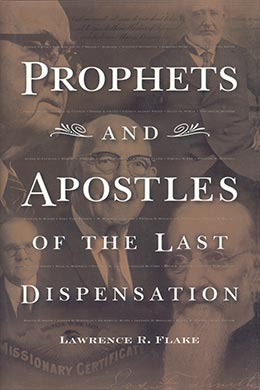The First Presidency: An Introduction
Lawrence R. Flake, Prophets and Apostles of the Last Dispensation (Provo, UT: Religious Studies Center, Brigham Young University, 2001), 3–6.
Technically speaking, the first offices held by General Authorities in this dispensation were those given 6 April 1830 to “Joseph Smith, Jun., who was called of God, and ordained an apostle of Jesus Christ, to be the first elder of this church; and to Oliver Cowdery, who was also called of God, an apostle of Jesus Christ, to be the second elder of this church” (D&C 20:2–3). As “first elder” the Prophet functioned as president of the Church for nearly three years before the Lord directed the formal organization of the First Presidency.
President of the Church
The man holding the office of president of the Church is the head of the kingdom of God on earth and “President of the High Priesthood of the Church” (D&C 107:65). In addition to being the senior apostle on the earth, the president of the Church is “a seer, a revelator, a translator, and a prophet, having all the gifts of God which he [the Lord] bestows upon the head of the church” (D&C 107:92).
The president is the only man on the earth who actively holds all of the keys of the kingdom of God and is the only one who can authorize the use of the priesthood by those who hold it. Hence all of the offices and functions of the priesthood depend on his authority for their meaning and power.
In regard to the president’s role as spokesman for God among men, the Lord has given the Saints this admonition: “Wherefore, meaning the church, thou shalt give heed unto all his words and commandments which he shall give unto you as he receiveth them, walking in all holiness before me; for his word ye shall receive, as if from mine own mouth, in all patience and faith” (D&C 21:4–5).
Assistant President of the Church
In accordance with the Lord’s requirement that “in the mouth of two or three witnesses shall every word be established” (D&C 6:28), the Lord instituted the office of assistant (sometimes called associate) president of the Church. Although various counselors to the Prophet Joseph Smith were referred to as “assistant presidents,” only two men in this dispensation have held the specific calling to preside over the Church jointly with the president. These men were Oliver Cowdery and Hyrum Smith.
On 5 December 1834 Oliver Cowdery was ordained assistant president of the Church. He had been a participant in many of the great events of the Restoration and from Peter, James, and John had received, jointly with Joseph Smith, the priesthood keys necessary to preside over the Lord’s kingdom on earth. Elder Bruce R. McConkie explains that “as the Assistant President, Oliver ranked second in authority to the Prophet. He stood ahead of the counselors in the First Presidency and ahead of the Council of the Twelve. .. Thus if the Prophet had died, Oliver Cowdery would have been the President of the Church.” [1]
Following President Cowdery’s apostasy from the Church, the Lord revealed that Hyrum Smith was to succeed him as a joint witness with Joseph: “And from this time forth I appoint unto him that he may be a prophet, and a seer, and a revelator unto my church, as well as my servant Joseph; that he may act in concert also with my servant Joseph” (D&C 124:94–95).
President Joseph Fielding Smith wrote: “I am firmly of the opinion that had Oliver Cowdery remained true to his covenants and obligations as a witness with Joseph Smith, and retained his authority and place, he, and not Hyrum Smith, would have gone with Joseph Smith as a prisoner and to martyrdom at Carthage. The sealing of the testimony through the shedding of blood would not have been complete in the death of the Prophet Joseph Smith alone; it required the death of Hyrum Smith who jointly held the keys of this dispensation.” [2]
Because the Church was fully established and the two witnesses had left their binding testimony of its truth, the necessity for the office of assistant president of the Church had been fulfilled. Thus this office is no longer found in the Church organization. [3]
Counselors in the First Presidency
According to a revelation given 28 March 1835, “three Presiding High Priests, chosen by the body, appointed and ordained to that office, and upheld by the confidence, faith, and prayer of the church, form a quorum of the Presidency of the Church” (D&C 107:22). The counselors to the president of the Church are high priests and may also be ordained to the office of apostle if the president wills it. If he bestows this sacred calling on a counselor, he may or may not elect to give him a place of seniority in the Quorum of the Twelve according to the date of his ordination.
Although the general pattern has been for the president to choose only a first and a second counselor, Joseph Smith, Brigham Young, David O. McKay, and Spencer W. Kimball called additional or assistant counselors during their administrations. At the death of the president of the Church, the quorum of the First Presidency dissolves and the counselors, if they are apostles and have been given or previously held a place in the Twelve, take their rightful positions in that quorum, which becomes the presiding council of the Church.
According to the order of succession, the senior member of the Quorum of the Twelve is chosen by revelation to become the next president of the Church with authority to choose counselors and reorganize the quorum of the First Presidency.
Notes
[1] Bruce R. McConkie, Mormon Doctrine, 2d ed. (Salt Lake City: Bookcraft, 1979), 55–56.
[2] Joseph Fielding Smith, Doctrines of Salvation, comp. Bruce R. McConkie (Salt Lake City: Bookcraft, 1954–56), 1:219.
[3] Smith, Doctrines of Salvation, 1:210–20.
